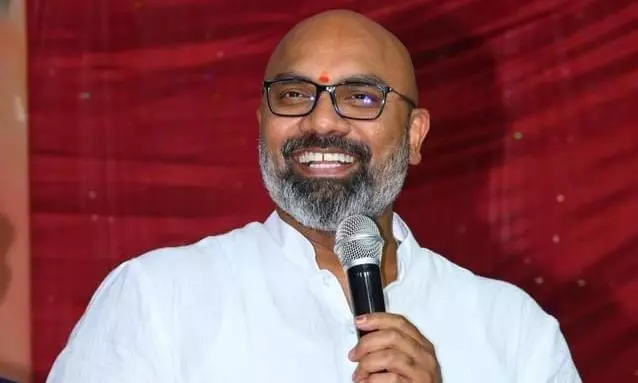
Some mourners shouted “Navalny” as his coffin arrived at the church
Moscow, Russia:
Late Russian opposition leader Alexei Navalny was laid to rest on Friday in a Moscow cemetery where thousands of mourners had gathered, two weeks after he died in an Arctic prison.
The anti-corruption campaigner, President Vladimir Putin’s most prominent opponent, was buried after a brief candle-lit funeral service in a nearby church.
The casket was left open in accordance with Russian Orthodox tradition but was quickly closed after the religious service where Navalny’s parents could be seen.
At the cemetery, Navalny’s coffin was lowered into the grave to the soundtrack of the film “Terminator 2” which his spokeswoman said was the 47-year-old’s favourite movie.
Navalny’s death has been condemned by Western leaders and his supporters have accused Putin of murder and of trying to prevent a dignified public burial.
The Kremlin, which has denied involvement and dismissed the accusations as “hysterical”, warned against “unauthorised” protests around the funeral.
“We won’t forget you!” and “Forgive us!” some mourners shouted, applauding as the coffin arrived for burial.
Thousands then filed past the grave to pay their last respects.
Nearby, a few hundred people could be heard shouting anti-war slogans.
‘Make you proud of me’
His widow Yulia Navalnaya, who has promised to continue his activism, paid tribute on social media.
“I don’t know how to live without you, but I will try my best to make you up there happy for me and proud of me,” she wrote.
She thanked him for “love, for always supporting me, for making me laugh even from prison, for always thinking about me.”
Earlier this week she said she feared the funeral could be disrupted by arrests.
Some 400 mourners have been detained at Navalny memorials since his death, rights organisation OVD-Info has said, and more detentions were feared at the funeral where a heavy police presence could be seen.
“Any unauthorised gatherings will be in violation of the law and those who participate in them will be held responsible,” Kremlin spokesman Dmitry Peskov said, according to TASS news agency.
“What are they afraid of?” one mourner, Anna Stepanova, told AFP outside the church.
“They are so afraid themselves,” she said. “The people who came here, they are not scared. Alexei wasn’t either.”
“People like him shouldn’t be dying: honest and principled, willing to sacrifice themselves,” she added.
The French, German and US ambassadors were seen among mourners outside the church, as were some of Russia’s last free independent politicians.
‘Nothing to say’
Navalnaya has blamed Putin for her husband’s death, which has sparked outrage among Western leaders and within the opposition.
Western governments have been quick to hold the Kremlin responsible but have stopped short of making direct accusations of involvement.
Putin’s spokesman Peskov has criticised the accusations made by her and some Western leaders as “vulgar”.
On the day of the funeral, Peskov said he had “nothing to say” to the family of Alexei Navalny.
Navalny shot to prominence through his anti-corruption campaigning, exposing what he said was rampant graft at the top of Putin’s administration.
Some mourners mentioned the huge influence Navalny had on their own political activism.
“Because of him I began to get involved in politics… He was the first public person that I listened to,” said 26-year-old Denis, a volunteer at a charity.
Navalny was arrested in January 2021 when he returned to Russia after being treated in Germany for a poisoning attack.
“Alexei was tortured for three years,” Navalnaya told lawmakers in Brussels.
“He was starved in a tiny stone cell, cut off from the outside world and denied visits, phone calls, and then even letters.”
“And then they killed him. Even after that, they abused his body,” she said.
‘Ideas will live on’
His body was held in a morgue for eight days before being returned to the family, which Navalny’s team believed to be a bid to cover up responsibility for his death.
His family and his team have also accused authorities of trying to prevent a dignified public burial, fearing it could turn into a flashpoint for dissent.
Navalny’s team said local investigators had threatened to bury him on the prison grounds if his mother did not agree to a “secret” funeral.
Once the body was released, allies struggled to find a place that would agree to hold a funeral ceremony, as well as hearse drivers.
And a civil ceremony allowing the general public to pay their respects to the body — common in Russia — has not been allowed.
Navalnaya has vowed to continue his life’s work and urged to “fight more desperately, more fiercely than before.”
In the crowd near the church, some seemed to agree.
“A person has died, but his ideas will live on thanks to those who have gathered here,” said Alyona, a 22-year-old archaeologist who came to pay her respects.
(Except for the headline, this story has not been edited by NDTV staff and is published from a syndicated feed.)


![Job Updates- Steno/ Typist Vacancy At District Legal Services Authority, Suryapet Unit, Telangana [Apply Now]](https://nowhyderabad.com/wp-content/uploads/2024/12/409041-job-opportunity-2-238x178.jpg)



![Job Updates- Steno/ Typist Vacancy At District Legal Services Authority, Suryapet Unit, Telangana [Apply Now]](https://nowhyderabad.com/wp-content/uploads/2024/12/409041-job-opportunity-2-100x75.jpg)
